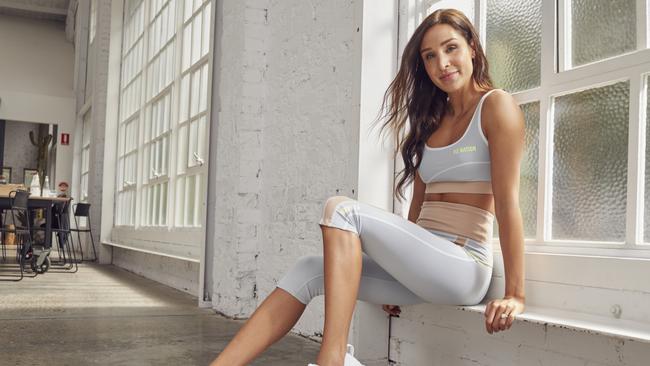Sweat books $80m write-down, $85m loss after Kayla Itsines sell fitness app
Digital workout platform Sweat has made an $85m loss in the first year since Kayla Itsines sold the worldwide fitness phenomenon.

An $80m write-down has plunged digital workout platform Sweat into a deep loss in its first year under foreign ownership, as it continues to battle with the revival of physical gyms and fitness centres.
US fitness giant iFIT has lodged its first set of financial statements for its Australian subsidiary since its acquisition in June last year, underlining the decline of the global digital fitness industry as people head back to the gym following three years of lockdowns and Covid-19 restrictions.
The unfavourable turn of fortune has almost completely wiped out the goodwill figure iFIT recognised at the time of its near $200m purchase of the Adelaide start-up.
Sweat reported an $85m loss in the 11 months to May, due largely to the $80.6m impairment charge reflecting the revised financial projections for the Australian business.
The 11-month reporting period brings Sweat into line with the reporting period of its new parent company.
Subscription revenue of $71.0m in the 11 months to May was well below the $98.6m reported in the 12 months to June 2021, with declining subscriber numbers across Australia, Europe and Sweat’s largest market in the US.
Stripping out the impact of the one-off impairment charge, Sweat reported an underlying EBITDA of $2.2m, up from $1.4m in the previous 12-month period.

The financial statements reveal iFIT has, to date, paid Sweat founders Kayla Itsines and Tobi Pearce $119.6m to take over the business they created in 2015, through a mix of cash, shares and incentive-based payments.
Goodwill of $81.4m was recognised at the time of purchase, when the home exercise boom was near its peak as Covid-19 lockdowns and restrictions forced people to exercise at home.
However, iFIT explains in the financial report how the end of the boom is affecting its Australian business.
“The impairment loss on goodwill … relates to the underperformance of the company compared to the initial expectation of the business from acquisition,” iFIT says.
“The decrease in revenue is due to increased competition in the market and follows the same trend as the major players in the digital fitness industry, where declining sales meant costs needed to be reduced to manage the negative results.
“Sweat, along with others in the digital fitness industry, is experiencing headwinds of reduced customer demand and increased competition from bricks and mortar fitness, along with many new entrants into the digital fitness market as pandemic restrictions eased across the financial year.”
The demise of the global digital fitness sector forced iFIT to abandon its $US600m-plus IPO plans in April, and resulted in a series of job cuts across its global empire, including at Sweat.
Dozens of jobs were recently cut at Sweat’s Adelaide office, where local staff numbers are down to about 45, down from close to 100 at the company’s peak.
On Thursday a company spokeswoman said Sweat had been “repositioned and right-sized” to cater to customers who were increasingly combining home workouts with in-gym exercise.
“A downturn in trading performance has resulted in a financial forecast below expectations,” she said.
“The business is focused on broadening the platform’s appeal, providing increasing holistic health, nutrition and wellbeing offerings, and is confident of being well placed for future growth following recent tough but necessary decisions.”
Sweat’s current liabilities of $30.5m exceeded its current assets by $10.5m at the end of May, and its operating activities generated a cash deficit of $5.2m in the 11-month period.
However iFIT says the current liabilities figure includes amounts that are not expected to be paid in the next 12 months.

“In addition, there is no indication the future operating cashflows of the business will be negative for the next period based on management’s best estimate,” iFIT says.
Itsines, 31, and Pearce, 30, both personal trainers, shot to fame after forming the Bikini Body Guide fitness program in 2015.
It evolved into Sweat, which became one of the world’s largest digital fitness training platforms for women.
The duo split in 2020 but remained business partners until Pearce’s departure from the business in February.
Itsines remains the face of the brand and is still involved in the running of the business.
iFIT, which is based in Logan, north of Salt Lake City in Utah, is one of the world’s largest players in the global “connected fitness” market, integrating digital apps like Sweat with its range of equipment including treadmills, rowers, exercise bikes and steppers.
Its acquisition of Sweat came with the promise of significant investment in the brand, development of new and improved training content, and a commitment to building the brand’s presence in key international markets.
However iFIT itself has been embroiled in a string of controversies in recent months, including a series of bitter legal disputes with arch rival Peloton and a $US355m capital raise that led to the removal of billionaire founder Scott Watterson from his role as chief executive.
In the lead up to its failed IPO bid, iFIT spent up big on marketing, bringing in the likes of Olympic swimming legend Michael Phelps to spruik the brand.





To join the conversation, please log in. Don't have an account? Register
Join the conversation, you are commenting as Logout